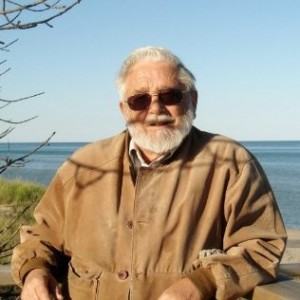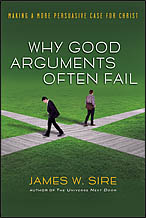
James W. Sire addresses:
What is the biggest challenge to today’s apologist? — A question received by email inquiry.
I doubt that there is a “today’s apologist.” Every person engaged in presenting the Christian faith is “today’s apologist.” Moreover, I can address the question but I am no longer an active traveling apologist with exposure to “today’s” campuses. Among my current friends are a bitter Dawkins-type atheist and retired scientist, a mid-forties New Ager, a curious high school grandson, a liturgical Christian devoted to the Prayer Book, and a couple of dozen close friends and fellow evangelical suburban Presbyterian church members mostly in the professions or retired. I will therefore answer briefly and more from what I observe about present culture than what I understand from my friends.
Apathy heads the list of challenges. Who cares about serious issues of religion and faith? Of course, apathy is more a cultural or spiritual condition than an intellectual puzzle. Pascal said wine, women, song and gambling were the major ways of escaping doubt and the terror of a universe empty of the divine. Today we could add sports, TV and video games. But on to some of the intellectual challenges.
From the Enlightenment to the onset of the postmodernism, in the 1970s as I judge, the most difficult issues to handle were all present to Christians in Western cultures. In no particular order, they are
- Is the Bible a trustworthy witness to either history or the truths about God and humanity?
- Is Christian faith reasonable?
- Did Jesus rise from the dead?
- Does God exist? If so, what is he, she or it really like?
- Can God forgive me or “save” me or transform my character for the better?
- How can anyone know that what they believe about religious matters is actually true?
- Isn’t religion just an illusion, a psychological projection of our desire for a Father?
- Don’t all religions boil down to the same thing?
The all-time biggie, however, has been and still is
(9) the problem of evil in its multiple dimensions —personal, social, psychological and philosophic. It continues, I think, to top the list of difficult questions to address, let alone answer.
Since the onset of postmodernism, all nine of these issues come in what I take to be the most frustrating of cultural garb —
(a) the split between the Public and the Private
(b) the radical difference between what can be known by
(i) the methodologies of natural science which yield knowledge about the material world
(ii) the imaginative rumination of the humanities and the social sciences which construct reality by the language they create.
There are a host of apologetics books that address all of these questions. My own contribution to them has come in
- The Universe Next Door (5th edition, InterVarsity Press, 2009, esp. the chapters on naturalism, nihilism and postmodernism)
- Why Should Anyone Believe Anything at All (InterVarsity Press, 1994)
- A Little Primer on Humble Apologetics (InterVarsity Press, 2006)
- Deepest Differences w/Carl Peraino (InterVarsity Press, 2009)
- Why Good Arguments Often Fail (InterVarsity Press, 2006).

The final volume listed contains an extensive annotated bibliography, categorized by such issues above as (1) —(9).
—————————-
Thank-you! to the member of our network who posed the question. Thank-you! to Jim for his response. If you’re a reader and desire to dig into the question further or ask another question, please reply to the blog post or email Tom. If you desire, we are more than willing to attribute the question to “Anonymous.”
A few follow-up questions for your consideration (personally or as part of a discussion):
* Do you likewise consider apathy the biggest challenge to “today’s apologist”? Why or why not? How has apathy affected your own pursuit of questions related to (and the practice of) following God with your head, heart, and hands?
* With regard to intellectual questions, do you consider the problem of evil in its multiple dimensions —personal, social, psychological and philosophic the most difficult of questions to address, let alone answer? What relationships, life situations, resources and contexts have been most helpful as you personally address the problem of evil?
* What are examples of questions you’re most pressed with in your own life and those with whom you have regular conversation? Are there particular questions you’re interested in having Sire and/or others address?
Note: Click here for other ESN blog posts by Jim Sire, including excerpts from his autobiography Rim of the Sandhills.
Updated profile picture/caption. 11/12/2012. 11:21PM CST.
Tom enjoys daily conversations regarding living out the Biblical Story with his wife Theresa and their four girls, around the block, at Elizabethtown Brethren in Christ Church (where he teaches adult electives and co-leads a small group), among healthcare professionals as the Northeast Regional Director for the Christian Medical & Dental Associations (CMDA), and in higher ed as a volunteer with the Emerging Scholars Network (ESN). For a number of years, the Christian Medical Society / CMDA at Penn State College of Medicine was the hub of his ministry with CMDA. Note: Tom served with InterVarsity Christian Fellowship / USA for 20+ years, including 6+ years as the Associate Director of ESN. He has written for the ESN blog from its launch in August 2008. He has studied Biology (B.S.), Higher Education (M.A.), Spiritual Direction (Certificate), Spiritual Formation (M.A.R.), Ministry to Emerging Generations (D.Min.). To God be the glory!

Leave a Reply